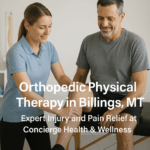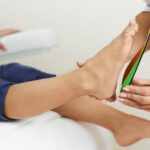Have you ever felt like the world was spinning around you, even when you were standing still? Or have you experienced sudden bouts of unsteadiness that make simple tasks like walking challenging? If so, you may be dealing with a vestibular disorder. This comprehensive guide will explore vestibular disorders, their symptoms, and the various treatment options available, including physical therapy and balance disorder treatment in Montana.
What are Vestibular Disorders?
Vestibular disorders are a group of conditions that affect the inner ear and brain, disrupting the body's balance and spatial orientation. These disorders can lead to various symptoms, including dizziness, vertigo, and difficulties with coordination and walking.
Common Types of Vestibular Disorders
- Benign Paroxysmal Positional Vertigo (BPPV)
- Labyrinthitis
- Vestibular neuritis
- Ménière's disease
- Vestibular migraine
Recognizing the Symptoms of Vestibular Disorders
Understanding the symptoms of vestibular disorders is crucial for early diagnosis and treatment. Some common signs include:
- Dizziness or vertigo
- Balance problems
- Nausea
- Hearing changes
- Vision disturbances
- Cognitive difficulties
If you regularly experience these symptoms, it may be time to consult with a healthcare professional or a physical therapist in Billings, Montana, specializing in vestibular rehabilitation.
The Impact of Vestibular Disorders on Daily Life
Living with a vestibular disorder can significantly impact your quality of life. Simple tasks like getting out of bed, walking, or watching television can become challenging. Many individuals with vestibular disorders may experience:
- Decreased independence
- Anxiety or depression
- Social isolation
- Reduced work productivity
- Increased risk of falls
Diagnosing Vestibular Disorders
Accurate diagnosis is crucial for effective treatment of vestibular disorders. Healthcare professionals may use a combination of the following methods:
- Physical examination
- Medical history review
- Balance tests
- Hearing tests
- Imaging studies (CT scan or MRI)
- Vestibular function tests
Treatment Options for Vestibular Disorders
While the specific treatment plan may vary depending on the type and severity of the vestibular disorder, there are several common approaches:
1. Vestibular Rehabilitation Therapy (VRT)
Vestibular rehabilitation is a specialized form of physical therapy designed to strengthen the vestibular system and improve balance. This therapy involves exercises that help the brain compensate for inner ear problems and may include:
- Gaze stabilization exercises
- Balance training
- Habituation exercises
- Canalith repositioning maneuvers (for BPPV)
2. Medication
In some cases, medication may be prescribed to alleviate symptoms such as nausea, dizziness, or vertigo. Common medications include:
- Antihistamines
- Anti-nausea drugs
- Anti-anxiety medications
3. Lifestyle Modifications
Making certain lifestyle changes can help manage symptoms and improve overall quality of life:
- Dietary changes (e.g., reducing salt intake for Ménière's disease)
- Stress management techniques
- Regular exercise
- Avoiding triggers (if identified)
4. Surgery
Surgical intervention may be considered in rare cases where conservative treatments are ineffective. This is typically reserved for severe or persistent cases.
Balance Disorder Treatment in Montana
If you're seeking balance disorder treatment in Montana, Concierge Health and Wellness in Billings, MT, offers comprehensive care for individuals struggling with vestibular disorders and balance issues.
Our experienced physical therapists specialize in vestibular rehabilitation, providing personalized treatment plans tailored to each patient's unique needs. We use state-of-the-art diagnostic tools and evidence-based treatment approaches to help our patients regain their balance and improve their quality of life.
What to Expect from Vestibular Rehabilitation
When you visit a physical therapist in Billings, MT, for vestibular rehabilitation, here's what you can expect:
- Comprehensive evaluation: Your therapist will assess your symptoms and medical history and perform various tests to understand your specific condition.
- Customized treatment plan: A personalized treatment plan will be developed to address your unique needs and goals based on the evaluation.
- Guided exercises: Your therapist will teach you specific exercises designed to improve your balance, reduce dizziness, and enhance overall function.
- Progress monitoring: Regular follow-ups will help track your progress and adjust the treatment plan.
- Home exercise program: You'll be given exercises to perform at home to complement your in-clinic sessions and accelerate your recovery.
The Benefits of Seeking Professional Help
While some mild vestibular disorders may improve independently, seeking professional help can lead to faster and more comprehensive recovery. Here's why:
- Accurate diagnosis: Professionals can differentiate between various types of vestibular disorders and other conditions that may cause similar symptoms.
- Tailored treatment: A personalized approach ensures you receive the most effective treatment for your specific condition.
- Faster recovery: Professional guidance can help you progress quickly and avoid potential setbacks.
- Improved safety: Learning proper techniques can reduce your risk of falls and injuries.
- Long-term management: Professionals can provide strategies for managing your condition in the long term, even after formal treatment ends.
Living with Vestibular Disorders: Tips for Daily Life
If you're living with a vestibular disorder, these tips may help you manage your symptoms and improve your daily life:
- Stay active: Regular, gentle exercise can help improve balance and reduce symptoms.
- Create a safe home environment: Remove tripping hazards and ensure good lighting to reduce fall risks.
- Practice relaxation techniques: Stress can exacerbate symptoms, so find ways to manage stress effectively.
- Follow a consistent sleep schedule: Good sleep hygiene can help reduce symptom severity.
- Be patient with yourself: Recovery takes time, and progress may not always be linear.
Conclusion: Take the First Step Towards Better Balance
Living with a vestibular disorder can be challenging, but with the right treatment and support, it's possible to manage symptoms effectively and improve your quality of life. If you're experiencing persistent dizziness, balance problems, or other vestibular disorder symptoms, don't wait to seek help.
At Concierge Health and Wellness in Billings, MT, we're committed to providing top-notch care for individuals struggling with balance disorders. Our experienced physical therapists are ready to guide you on your journey to better balance and improved well-being.
Ready to regain control of your balance and live life to the fullest? Schedule your consultation with the Best Physical Therapist in Billings, MT, today. Let us help you navigate the path to recovery and rediscover the joy of steady, confident movement.

















